The President of Uzbekistan addressed the 78th session of the UN General Assembly

On September 19, the general political debate of the 78th session of the UN General Assembly began at the United Nations Headquarters in New York City. The President of the Republic of Uzbekistan Shavkat Mirziyoyev addressed the event.
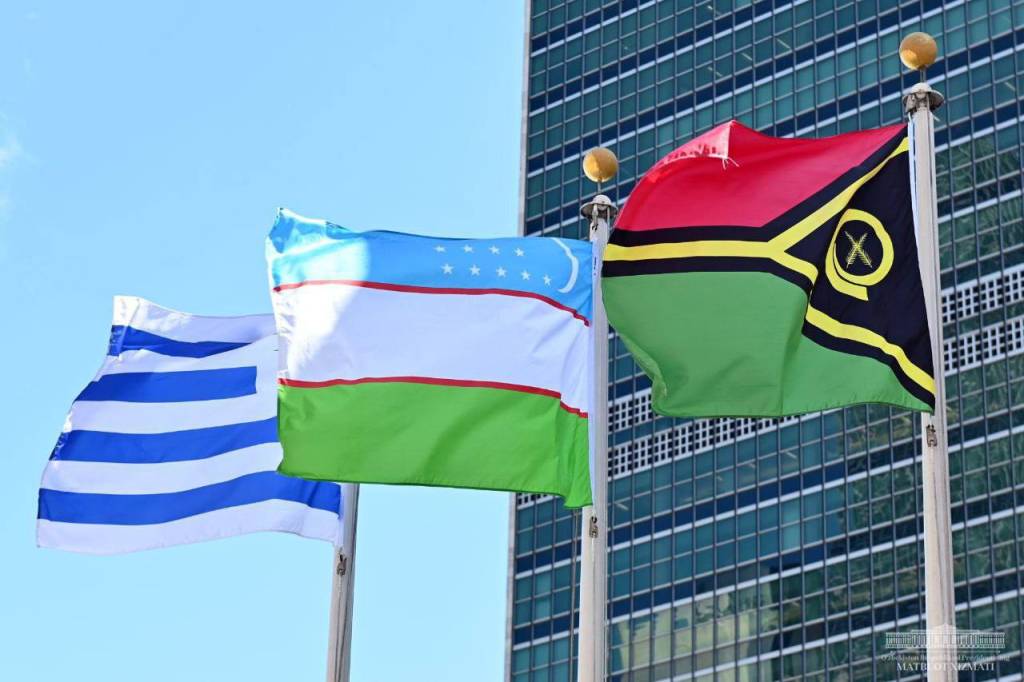
On the first day, the debates, led by session chairman Dennis Francis, are attended by the UN Secretary-General António Guterres, leaders of member states – Presidents of the United States of America Joseph Biden, the Federative Republic of Brazil Luiz Inácio Lula da Silva, the President of the Republic of Türkiye Recep Tayyip Erdogan, Republic of South Africa Cyril Ramaphosa, Amir of the State of Qatar Sheikh Tamim bin Hamad Al Thani, and heads of other states.
In his address, the President of the Republic of Uzbekistan Shavkat Mirziyoyev stated the need to preserve the spirit of harmony and practical cooperation, to unite countries on the basis that common interests are higher than existing contradictions.
“Last year, we launched the “Samarkand Solidarity Initiative” for common security and development. Our main goal is to comprehensively understand the responsibility for the present and future of our countries and peoples and to engage in a global dialogue with all parties ready for open and constructive cooperation”, the Leader of Uzbekistan said.
Confidence was expressed that holding a Summit of the Future next year at the initiative of the UN Secretary-General will serve to address the current challenges of international and regional development and increase the influence and effectiveness of the Organization.
The President of Uzbekistan mainly focused on the large-scale and irreversible reforms carried out in recent years in Uzbekistan and put forward several initiatives aimed at solving the most pressing issues on the global and regional agenda.
“We remain committed to continuing our policy of creating a New Uzbekistan, a law-governed, secular, democratic, and social state. Our country is boldly pursuing the path of fundamental reforms aimed at strengthening the principles of democracy and justice, based on the noble idea of “in the name of human values and interests”, the President noted.
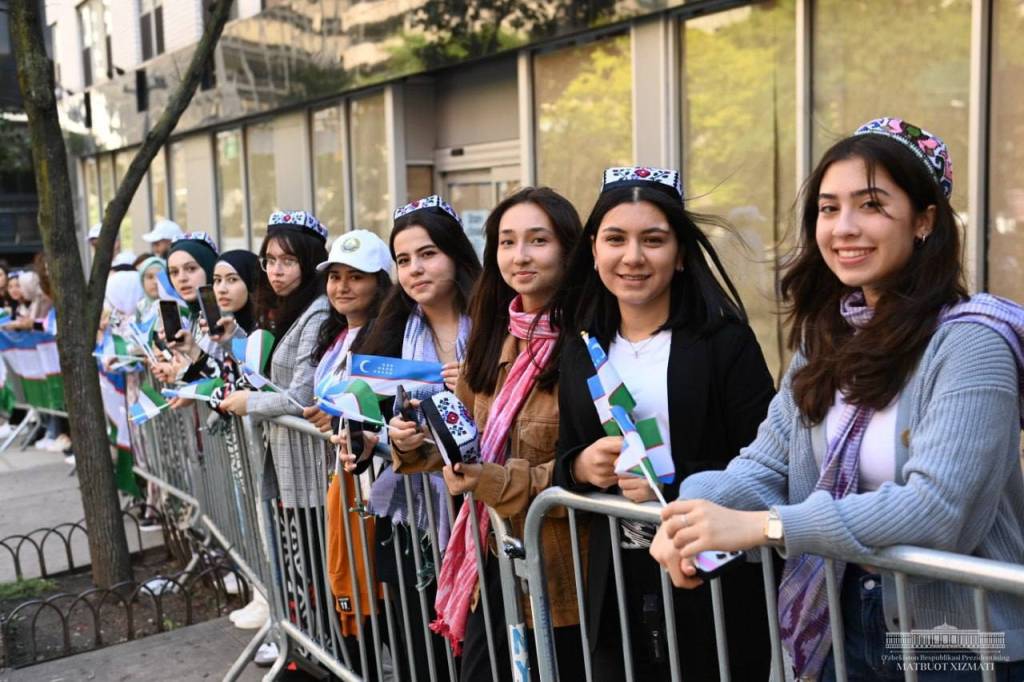
It was noted that a nationwide referendum in Uzbekistan, held on the renewed Constitution, defines national development priorities. In the Basic Law, commitment is reaffirmed to the principles of equality of all citizens, human rights, and freedom of speech and conscience, regardless of nationality, language, and religion. The Development Strategy “Uzbekistan – 2030” adopted on this legal basis, is in line with the United Nations Sustainable Development Goals.
The President of Uzbekistan noted that despite the global challenges, Uzbekistan is showing steady growth. Over the past six years, the gross domestic product has grown over 1.5 times. The main objective is to double this figure by 2030.
Another priority of our economic liberalization is to become a full member of the World Trade Organization in the near future.
Since 2017, poverty in the country has been halved thanks to the policies aimed at improving the living standards of people. It is planned to reduce it to 7 percent by 2030.
“We support the UN Secretary-General’s initiative Global Accelerator on Jobs and Social Protection. To share best practices within the framework of this initiative, we propose to hold in 2024 in our country the World Conference “Social Protection: the Path towards Development” under the auspices of the United Nations”, the Leader of Uzbekistan said.
The meeting participants were presented with the results achieved in protecting human rights and the complete prohibition of forced and child labor in the country.
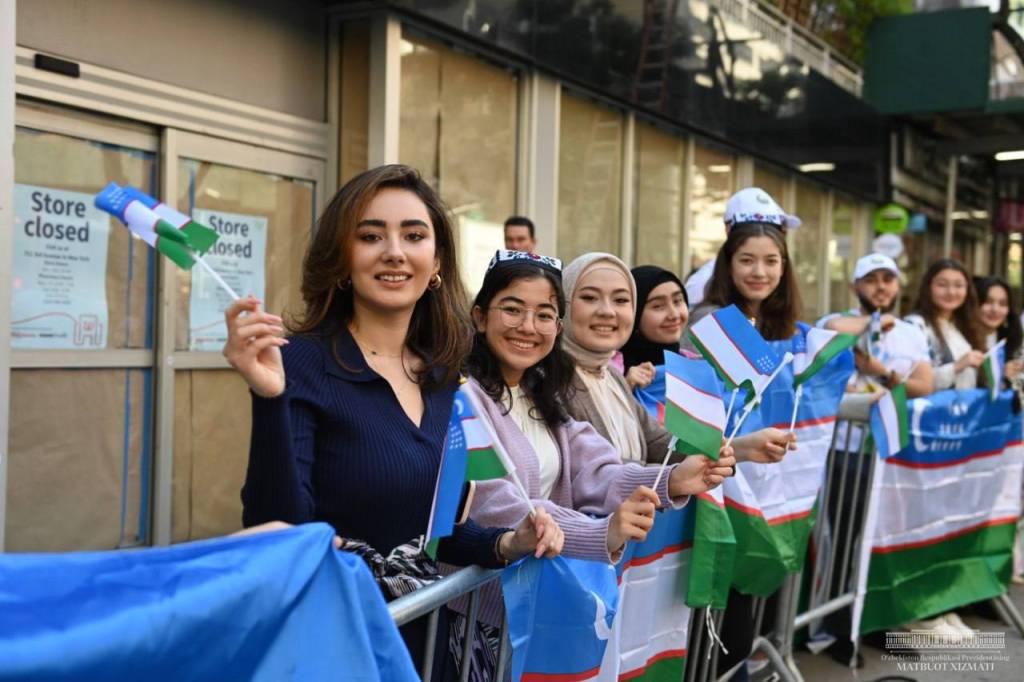
– Millions of people were forced to pick cotton in Uzbekistan for a century. Most of the population – teachers and doctors, entrepreneurs, workers and employees, and, unfortunately, schoolchildren and university students – were mobilized to pick cotton every year from September to December.
As a result, boycotts of 'Uzbek cotton' were announced, and the country was blacklisted for years. Thanks to our firm will and determination, now it is all history. Our people have been wholly liberated from cotton slavery, – the Head of state emphasized.
As the President noted, one of Uzbekistan’s strategic tasks is developing human capital and training a creative young generation.
In this respect, considerable experience has been gained in recent years – the education system is undergoing radical transformations. In the last six years, the coverage of preschool education has increased from 21% to 70% and higher education from 9% to 38%. By 2030, conditions will be created for every child to access preschool education and for half of secondary school graduates to obtain higher education.
The Head of state expressed his firm intention to continue to strengthen good neighborliness, stability, cooperation, and development in Central Asia.
Thanks to joint efforts, Uzbekistan has managed to address problems of state borders, transport corridors, and water use with all its neighbors.
Mutual trade between the countries of the region has grown by more than two and a half times, and the number of joint ventures has increased fivefold. The region has become a promising center for economic development, transport, and communications bridge connecting East and West, North and South.

– It is safe to say that our people unite around a growing sense of regional identity, and this sense is growing even stronger, – Shavkat Mirziyoyev noted. – It is not only our history that is common, but also our future and our vital interests that are shared. Expanding our regional cooperation is and will be our only choice!
Confidence was expressed that with the support of the international community, Central Asia will continue on the path of unity. In this regard, transforming Central Asia into a peaceful and prosperous region will remain a priority goal of Uzbekistan’s foreign policy.
It was noted that in Central Asia, where almost half of the population belongs to the younger generation, youth issues and creating opportunities for realizing their potential have the utmost importance.
At the initiative of the President of Uzbekistan, to strengthen cooperation in this sphere, the countries of the region have recently signed an Agreement on the Common Dimension of the Youth Policy.
To establish practical cooperation in this area with the United Nations and its specialized structures, it was proposed to create a Working Group to promote youth development in Central Asia and develop the “Central Asia Youth Agenda – 2030” program.
Another pressing issue is the participation of women in managing the affairs of society and the state.
“The noblest goal of our national policy is to ensure family stability, legal protection, and peaceful life for women”, the Leader of Uzbekistan noted.
An interest was expressed in further expansion of cooperation with UN Women. As a joint initiative, it was proposed to hold the Asian Women Forum in Uzbekistan next year to discuss the issues of fulfilling the creative potential of women and exchange experience.
Pointing to the acute environmental situation and the intensification of the triple planetary crisis caused by climate change, loss of biodiversity, and environmental pollution, the President noted that Central Asia is becoming one of the most vulnerable regions to climate change.
The efforts undertaken by Uzbekistan to eliminate the consequences of the Aral tragedy, data on the negative impact of climate change in the region, and the downward trend in water availability were presented.
Considering this situation, establishing the position of the Special Representative of the UN Secretary-General for Water Resources, a Water Saving Technologies Platform in Central Asia, and building up systematic cooperation as part of the Green Development Program adopted by the counties of the region was supported.
– In this context, I believe introducing the Central Asian Climate Dialogue would be expedient. We put forward an initiative to adopt a UN General Assembly Resolution “Central Asia Facing Global Climate Threats: Solidarity for Common Prosperity”.
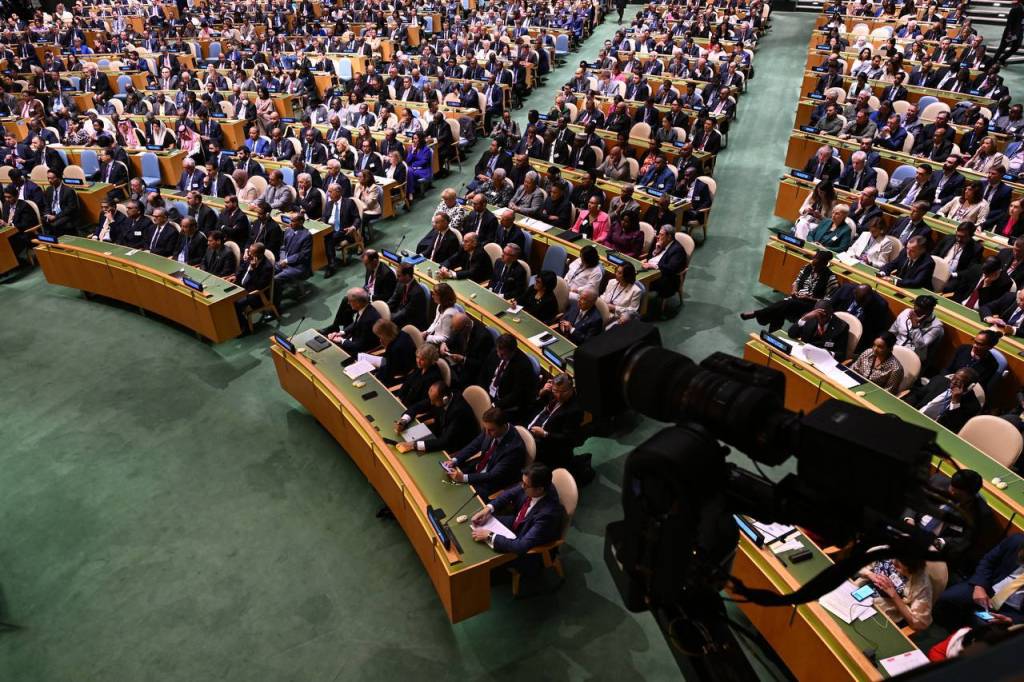
We propose to discuss its substance at the International Climate Forum in Samarkand next year, – the President of Uzbekistan said.
It was emphasized that adapting the main sectors of Uzbekistan’s economy to climate change, achieving carbon neutrality, and drastically increasing the share of green energy remains a strategic task.
The Head of state also focused on intensifying joint efforts to prevent the spread of extremism and radicalization of youth.
It was noted that as part of the National Strategy on Countering Extremism and Terrorism, special attention is paid to helping people affected by extremist ideas return to a normal life and reintegrate into society. The humanitarian operation “Mehr” (‘Benevolence’) was conducted five times. As part of that operation, more than 530 citizens from conflict zones were repatriated to the country, primarily women and children.
– In June this year, here at the United Nations Headquarters, the international community learned the stories of people repatriated to our country and embarked on a new life.
To continue ongoing actions in this direction and promote a permanent exchange of experience, we have taken specific measures to establish the Regional Experts Council on systemic work with persons repatriated from combat zones under the auspices of the United Nations Counter-Terrorism Office, – the President said.
In addition, the Leader of Uzbekistan called for the prevention of cases of religious intolerance and Islamophobia, which have recently been observed in some countries.
To promote the ideas of interreligious tolerance and harmony in the world, it was proposed to establish an International Centre for Interreligious Dialogue and Cooperation in Uzbekistan under the auspices of UNESCO.
“We take great pride that our country is a Homeland of profound scholars and thinkers, such as Al-Khwarizmi, Al-Biruni, Ibn Sina, Imam Bukhari, Mirzo Ulugbek, and Alisher Navoi, who made incomparable contributions to the development of science and shown Islam to be a religion of peace, knowledge and enlightenment”, the Head of state noted.
To study the rich heritage of these great scholars and reveal to the world the true humane essence of Islam, organizing the International Conference “Islam: a religion of peace and kindness” in Uzbekistan in 2024 was proposed.
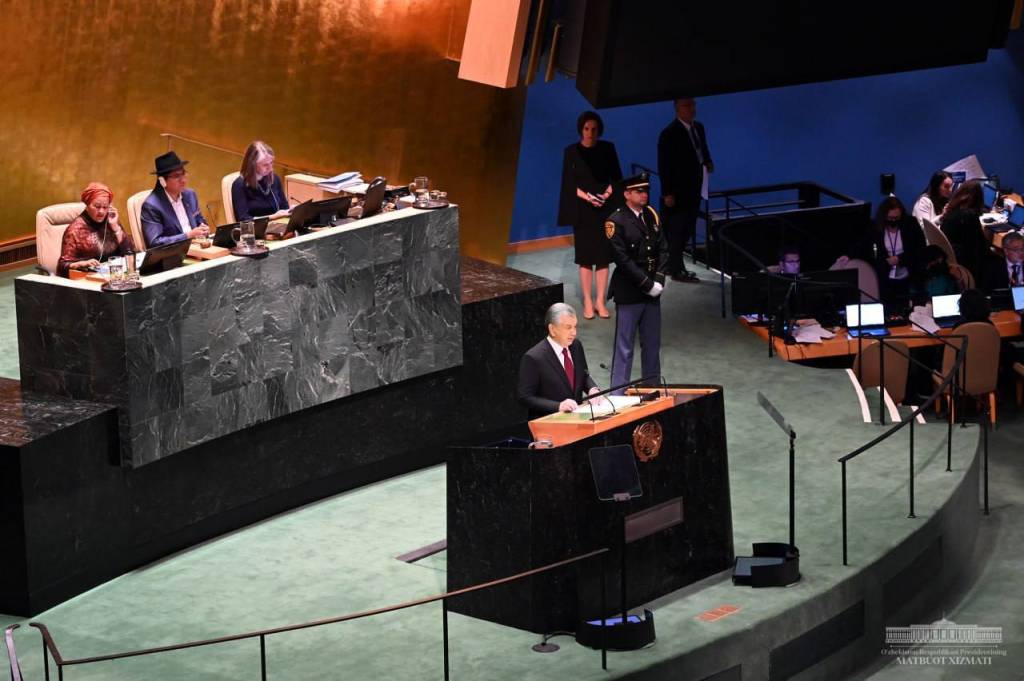
It was emphasized that international security is directly related to the processes in Afghanistan. A new situation has emerged in this country, which requires special approaches. Ignoring, isolating, and imposing sanctions are worsening the situation for ordinary Afghan people.
Expressing the view that humanitarian assistance to the Afghan people should not weaken, the President called for developing appropriate mechanisms to utilize Afghanistan’s frozen international assets to address the acute social problems in that country.
“We need an open, peaceful, and sustainable Afghanistan that is actively engaged in regional cooperation initiatives and ready for mutually beneficial partnerships with its neighbors and other countries”, the Head of the state noted.
Standing at the high rostrum of the UN, the President of Uzbekistan urged the international community to come together to resolve the issue of Afghanistan and under the leadership of the United Nations, to jointly develop a flexible and constructive approach to the Afghan problem.
In conclusion, it was noted that in this turning point in history, we must all consider what planet we leave to future generations: “Only through common aspirations and joint efforts can lasting peace and prosperity be achieved. More than ever, we need mutual trust, solidarity, and cooperation”.
Uzbekistan’s readiness to deepen a broad and long-term partnership with United Nations institutions and all states was reaffirmed.







